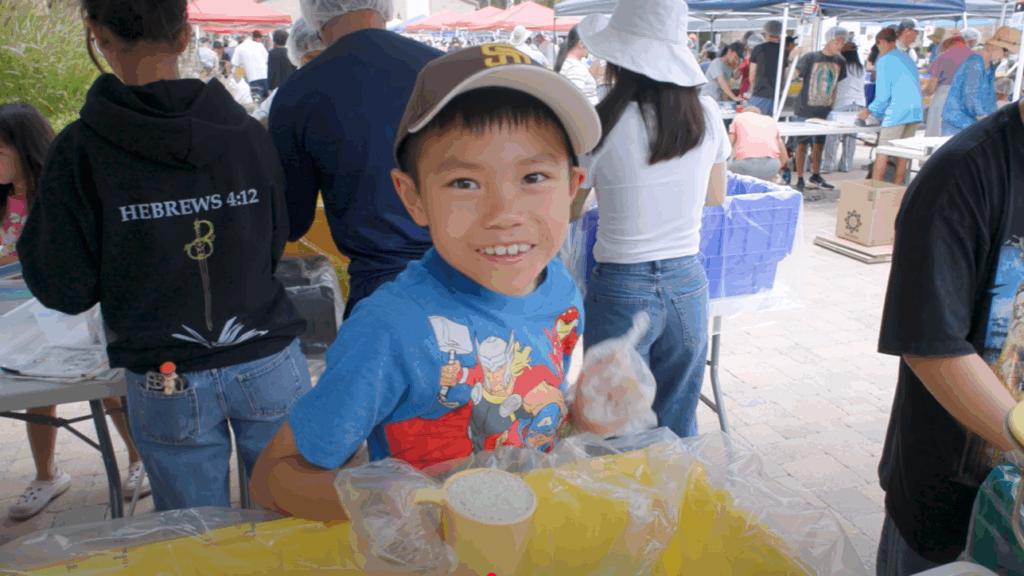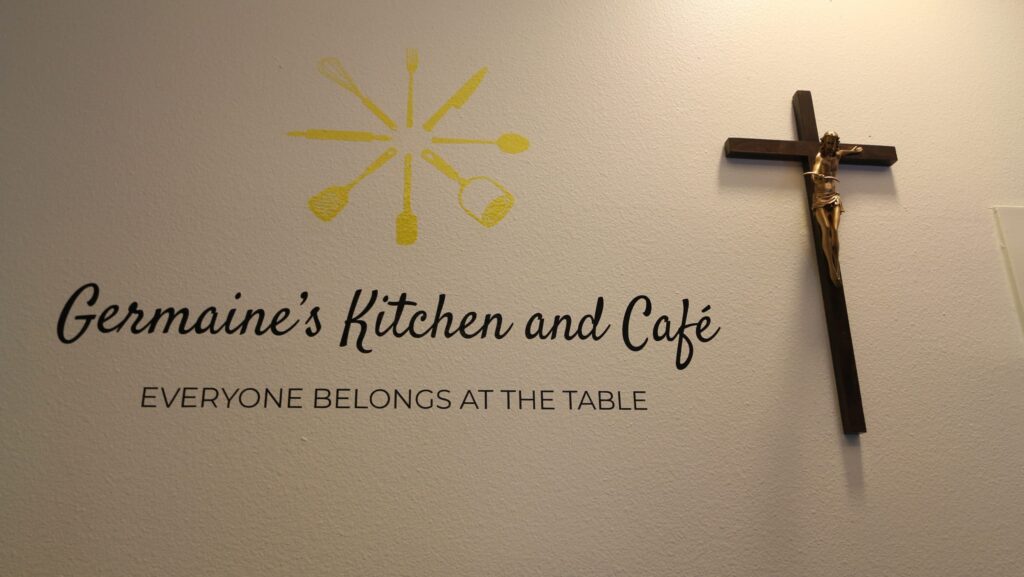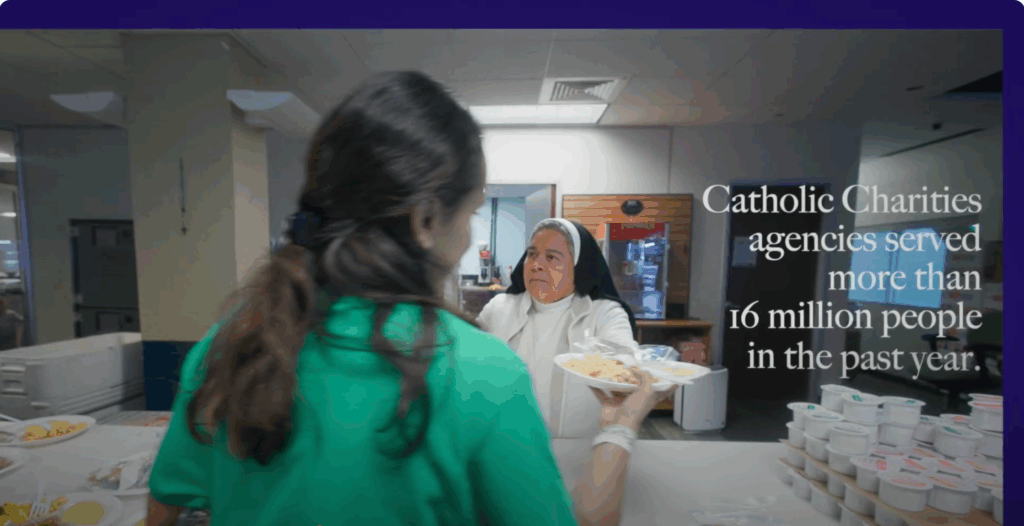
Culinary training program feeds souls and stomachs

Clad in crisp black aprons, they massage pepper, garlic and thyme into the cubed beef. “Become one with the food,” chef Jon Wirtis tells them. The students then drizzle oil into large pots, wait for the fat to sputter and pop, and add the seasoned meat.
“Beauuutiful,” says Wirtis as the contents sizzle and a savory aroma fills the kitchen.
The dish in progress — featuring locally sourced, gluten-free ingredients — could be served up at one of the city’s trendy food trucks or brick-and-mortar restaurants to professionals on their lunch break. This hearty beef and quinoa soup, however, is being prepared by individuals with developmental disabilities for Portlanders living in shelters or on the streets.
The model is part of a new culinary workforce development program underway at Catholic Charities of Oregon.
“It’s empowering a group of people who are sometimes told they don’t have a place in society or anything to contribute,” said Alexandra Carroll, with the U.S. bishops’ Catholic Campaign for Human Development. A national CCHD grant helped launch the initiative. “At the same time, it’s providing a basic necessity to another vulnerable group,” she said. “What a beautiful combination.”
‘Everyone belongs at the table’
In August, the first cohort of students arrived at Germaine’s Kitchen and Café, a window-lined, expansive wing of Catholic Charities’ Southeast Portland headquarters. For 16 weeks participants spend hours in the space preparing for a range of entry-level jobs at restaurants, hotels or health care facilities.
The three current students, dressed in shirts with the program tagline, “Everyone belongs at the table,” begin the day at 9 a.m. in a classroom near the kitchen. There they are introduced to a specific skill, such as sauce making, and go over recipes and methodology.
“Then we delve into whatever the meal of the day will be for the food insecure, and we figure out who is doing what,” Wirtis said. The small size allows for ample individual attention and time for clarifications.
Prep work is performed the day prior, so on a recent morning students swiftly set to work plating and packaging the food, which is kept warm and ready for distribution to homeless individuals at around 11 a.m.
Each student was absorbed with a task: Adriana Olvera, 45, carefully grabbed handfuls of salad greens and placed them into small containers; Trevor Richen, 33, ladled chicken pot pie filling into trays holding flaky biscuits; 30-year-old Di Chen maneuvered a vacuum sealer machine, adroitly covering each to-go meal in plastic wrap.
Every so often there was a “Hey, Chef Jon!” followed by a question. In a voice at once booming and warm, Wirtis offered guidance plus words of encouragement.
Adriana Olvera typically is in charge of salads during the plating and packaging portion of the day.
Fulfilling a need
Over the past decade, Oregon has moved from state-funded segregated work settings for people with disabilities to integrated employment. While agencies have stepped in to help individuals enter the mainstream workforce, levels of unemployment are exceptionally high. Statistics published by the federal government indicate 62% of Oregonians with disabilities were unemployed as of 2018. Nationally, those with a disability live in poverty at more than twice the rate of their nondisabled counterparts, according to the National Council on Disability.
Germaine’s Kitchen and Café has emerged as “a wonderfully creative enterprise” to help address this sizable challenge, said Kelsey Bell, coordinator for the Portland archdiocesan Office for People with Disabilities and part of the team that secured initial funding for the program.
Bell said not everyone can do every job. “But we should work to eliminate barriers where we can,” she said. “We are all better for it when all are included. The body of Christ needs all its members.”
Meals for the marginalized
Germaine’s Kitchen and Café was set to open in 2020 and serve as both a training program and neighborhood restaurant. When the pandemic arrived, it stalled plans but also added a meaningful layer to the model.
In the early days of COVID-19 many agencies that traditionally provided meals to Portland’s large homeless community temporarily closed. To address a potentially dire food shortage, Catholic Charities obtained a contract from Multnomah County’s Joint Office of Homeless Services and began using the kitchen space to create more than 100 meals a day for the unhoused. Dishes were brought to shelters and homeless camps, as well as guests of St. Francis Dining Hall in Southeast Portland and participants in Catholic Charities’ transitional housing programs.
Overseen by Wirtis, the effort has continued and was linked to the culinary training program.
“I think the cafe’s delay is a blessing in disguise,” said Cindy Dulcich, a retired teacher who leads a life skills unit for the students. “Now they have the wonderful feeling that they are using their culinary skills to do good in the world.”
“It feels amazing to give back,” said Richen, taking a break from scooping chicken pot pie ingredients. “I hope I can continue to do that in a job.”
The program’s timing coincides with a burgeoning need in the food-service sector, said Deacon Rick Birkel, executive director of Catholic Charities of Oregon.
Hard hit by the pandemic, restaurants have one of the highest levels of unfilled job openings of any industry. As a foodie town, “there are a lot of job opportunities here in Portland and I think we can help close a gap,” said the permanent deacon.
‘Independence and confidence’
At around 11:45 a.m. in the cafe, everyone lunches on the meal they’ve created and chats about how the day has gone so far. Food is a primary topic but others are in the mix, including sports; Richen is a self-proclaimed baseball nerd and Olvera a football fan.
The afternoon is packed with prep work and additional instruction that covers kitchen math, safety and sanitation. Students will leave the program with a state-approved food handler card.
Before the day wraps up at 3:30 p.m., there’s more intensive hands-on learning in the kitchen. Mistakes happen, but enthusiasm is as ubiquitous as mouth-watering smells.
Wirtis recalled the day students practiced egg cookery. “I had them flip eggs using the frying pan, and one time Di’s didn’t make it back in,” he said. “I told her, ‘Just wait, you’ll get it over time.’ She did get it, and we celebrated like there was no tomorrow.”
Dulcich, a member of Holy Family Parish in Southeast Portland and a longtime supporter of Catholic Charities, is impressed by the students’ growing proficiency in the kitchen. “They look like they’re on ‘Top Chef’ with their knife skills,” she said, laughing.
To help students be as employable as possible and navigate a new job successfully, the program includes a twice-weekly life skills class.
“They learn to slice, dice, fry, roast, bake and broil with great ingredients,” said Wirtis. “Then when you combine that with life skills, it truly changes the whole person. They gain a greater sense of independence and confidence.”
Dulcich teaches basic budgeting, explains credit scores and spends time on effective communication, a skill prized by employers.
The sessions cover interview questions and resumes, and “since day one students have been practicing their elevator speech so they can sell themselves,” said Dulcich.
She also leads a segment on stress. “It can get hot in more ways than one in a kitchen, so we’ve gone over breathing techniques,” said Dulcich.
Chen said stress made a previous job difficult to manage.
“I had a job as a dishwasher and the dishes would start to pile up and I’d get frustrated and overwhelmed,” she said. “I’m learning that if I get overwhelmed, I can feel calmer and get it done anyway.”
Lori Irish Bauman, a retired lawyer, fellow member of Holy Family and the visionary behind the cafe, serves as a liaison to social service agencies and connects program parents and caregivers with resources.
“Germaine’s Café is living out Catholic social teaching,” said Bauman. “It’s showing a preferential option for the poor and vulnerable and reflects the principle of subsidiarity — that local solutions closely attuned to people’s needs help individuals have the best life possible.”
Since the early stages of the effort, “we’ve wanted to help people live up to their personal potential,” Bauman said. “I have to think we are accomplishing just that.”
A crucifix hangs in the new kitchen and cafe, located in Catholic Charities’ Southeast Portland headquarters.
Top-notch guide
Wirtis, who’s given a TED Talk on how food can transform communities, has heft as both a chef and a problem-solver for the disenfranchised.
After graduating from the prestigious Culinary Institute of America, he was executive chef at Portland’s McCormick and Schmick’s, an upscale seafood and steak chain, and taught at a Portland-based affiliate of Le Cordon Bleu, a French culinary institute founded in 1895.
Meanwhile, he developed a culinary training program for individuals emerging from incarceration, rehab and homelessness and worked with youths in foster care.
People with intellectual and developmental disabilities are a new demographic for Wirtis. “I’ve learned to tweak some of my teaching methods and learned to be more descriptive and to reiterate things in different ways,” he said. “This experience has made me a better teacher and been so rewarding, that’s for darn sure.”
Praise for Wirtis abounds.
Dawn Bootz works for Community Vision Inc., a Portland nonprofit that contracts with the state to help people with intellectual disabilities secure employment.
Bootz recently visited Germaine’s Kitchen and Café and noticed the accessible layout of the kitchen, which Wirtis helped design. “He knocked it out of the park for people with disabilities,” she said.
Some of the most beneficial elements are simple. The spices, for instances, are arranged by color. “That makes it easy for people to go and grab what they need,” said Bootz. “Even if someone doesn’t know how to read or spell ‘cilantro,’ they know they can look in the green section.”
Jon Wirtis, executive chef and instructor for Germaine’s Kitchen and Café, poses in the spacious kitchen.
‘It gives me goose bumps’
The original plan to combine the training program with a student-run neighborhood cafe is still in the works. The blocks around the agency headquarters are “a bit of a food dessert,” so there’s a niche to fill, said Deacon Birkel. A McDonald’s and Burgerville are nearby but not much else.
Catholic Charities intends the program eventually to serve additional groups experiencing barriers to employment, including the formerly homeless and incarcerated, those battling addiction, and survivors of domestic violence.
For now, though, the focus is on helping the first cohort complete their training and welcoming a new group this fall.
The program culminates with students operating a small lunchtime cafe during the last few weeks. For the first cohort it will be out of the Catholic Charities facility, where they will serve staff and possibly hungry teens from nearby Cleveland High; the second group will run a cafe at Sacred Heart Villa, a low-income residence for Portland seniors.
“Students will do it all,” said Wirtis. “They will serve as line cooks, prep cooks, dishwashers and they’ll wait tables.”
Bootz said the comprehensive nature of the program makes it unique in the region. “There are other provider organizations like us that have life skills and training classes, but I don’t know of anything as complete and immersive as Germaine’s Café.”
Bootz added that many of the individuals she’s worked with long to contribute to their communities.
“The fact that the students at Germaine’s are learning all these skills and then turning around and serving food to people on the streets and others in need — well, it gives me goose bumps talking about it,” she said. “This effort is really feeding people’s souls as well as their stomachs.”
Published with the permission of the National Catholic Reporter for the original story by Katie Scott.








